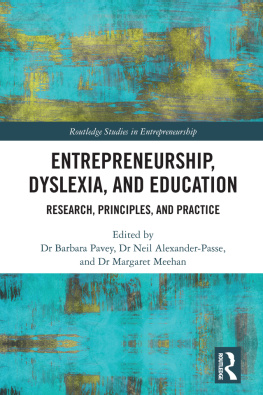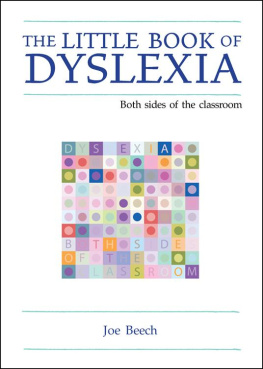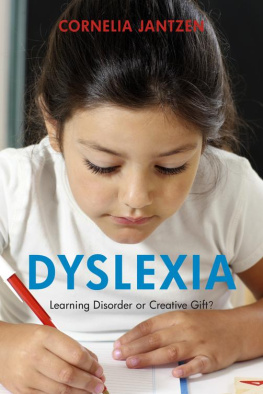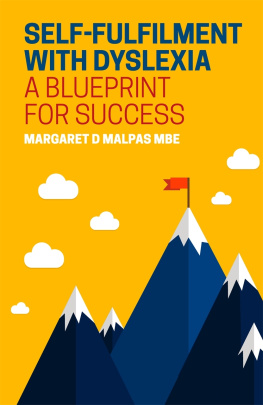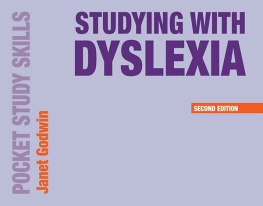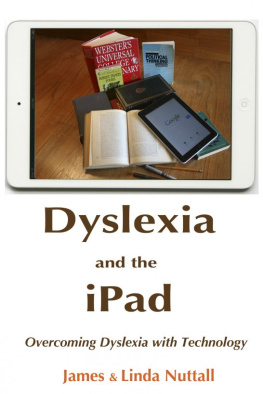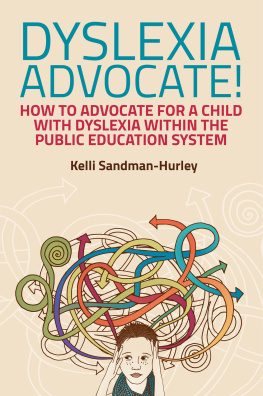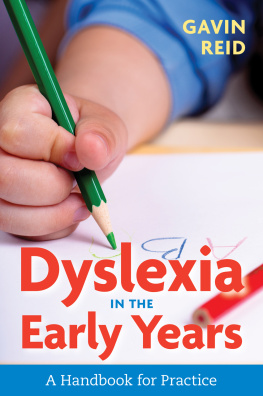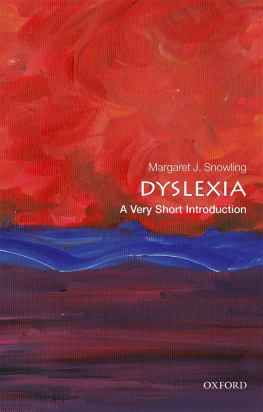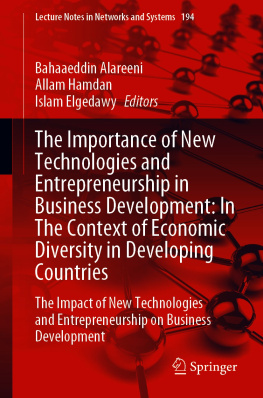Entrepreneurship, Dyslexia, and Education
The development of entrepreneurial abilities in people with dyslexia is a subject of great interest. It has gained increasing importance in economically difficult times because of its potential for the development of new business opportunities. This book brings together contributions from researchers, educators, and entrepreneurs with dyslexia, investigating this subject from many perspectives.
Is there something different in the profile of a person with dyslexia that supports the development of entrepreneurship? This book aims to draw out key themes which can be used in education to motivate, mentor, and create the business leaders of tomorrow. It offers a fundamental text for this area of study with a comprehensive, international examination of its topic. It includes views by new and established international writers and researchers, providing up-to-date perspectives on entrepreneurship, dyslexia, and education. It is accessible to read, to understand, and to learn from and is suitable for recommended reading for graduate and postgraduate students.
The diverse views and perspectives demonstrated in this book make it as relevant as possible for a wide group of readers. It informs study in the fields of business and dyslexia, and will be of interest to educators, researchers, and to anyone interested in the overlap of entrepreneurship and dyslexia.
Barbara Pavey is an independent dyslexia and special educational needs and disability specialist and author, focusing on Dyslexia-Friendly principles and techniques, and with a particular interest in entrepreneurship.
Neil Alexander-Passe is a special educational needs and disability coordinator in primary and secondary schools and an expert inclusion adviser to the UKs Department of Education, and his focus is the emotional impact of dyslexia.
Margaret Meehan is a specialist tutor in higher education, previously directing tutor support, and a former chartered chemist and chartered science teacher. As an author she is concerned with researching the holistic impact of dyslexia and other learning attributes.
Routledge Studies in Entrepreneurship
This series extends the meaning and scope of entrepreneurship by capturing new research and enquiry on economic, social, cultural and personal value creation. Entrepreneurship as value creation represents the endeavours of innovative people and organisations in creative environments that open up opportunities for developing new products, new services, new firms and new forms of policy making in different environments seeking sustainable economic growth and social development. In setting this objective the series includes books which cover a diverse range of conceptual, empirical and scholarly topics that both inform the field and push the boundaries of entrepreneurship.
A History of Enterprise Policy
Government, Small Business and Entrepreneurship
Oliver Mallett and Robert Wapshott
New Frontiers in the Internationalization of Businesses
Empirical Evidence from Indigenous Businesses in Canada
Fernando Angulo-Ruiz
Contextualizing Entrepreneurship Theory
Ted Baker and Friederike Welter
Entrepreneurial Marketing and International New Ventures
Antecedents, Elements and Outcomes
Edited by Izabela Kowalik
Entrepreneurship, Dyslexia, and Education
Research, Principles, and Practice
Edited by Barbara Pavey, Neil Alexander-Passe, and Margaret Meehan
For a full list of titles in this series, please visit www.routledge.com/RoutledgeStudies-in-Entrepreneurship/book-series/RSE
Entrepreneurship, Dyslexia, and Education
Research, Principles, and Practice
Edited byBarbaraPavey,NeilAlexander-Passe,andMargaretMeehan
First published 2021
by Routledge
52 Vanderbilt Avenue, New York, NY 10017
and by Routledge
2 Park Square, Milton Park, Abingdon, Oxon, OX14 4RN
Routledge is an imprint of the Taylor & Francis Group, an informa business
2021 Taylor & Francis
The right of Barbara Pavey, Neil Alexander-Passe, and Margaret Meehan to be identified as the authors of the editorial material, and of the authors for their individual chapters, has been asserted in accordance with sections 77 and 78 of the Copyright, Designs and Patents Act 1988.
All rights reserved. No part of this book may be reprinted or reproduced or utilised in any form or by any electronic, mechanical, or other means, now known or hereafter invented, including photocopying and recording, or in any information storage or retrieval system, without permission in writing from the publishers.
Trademark notice: Product or corporate names may be trademarks or registered trademarks, and are used only for identification and explanation without intent to infringe.
Library of Congress Cataloging-in-Publication Data
Names: Pavey, Barbara, editor. | Alexander-Passe, Neil, editor. |
Meehan, Margaret, editor.
Title: Entrepreneurship, dyslexia and education: research, principles
and practice/edited by Barbara Pavey, Neil Alexander-Passe and
Margaret Meehan.
Description: New York, NY: Routledge, 2021. | Series: Routledge
studies in entrepreneurship | Includes bibliographical references
and index.
Identifiers: LCCN 2020032789 (print) | LCCN 2020032790
(ebook) | ISBN 9780815396468 (hardback) |
ISBN 9781351036900 (ebook)
Subjects: LCSH: Entrepreneurship. | DyslexicsIntellectual life.
Classification: LCC HB615.E577883 2021 (print) | LCC HB615
(ebook) | DDC 338/.04071dc23
LC record available at https://lccn.loc.gov/2020032789
LC ebook record available at https://lccn.loc.gov/2020032790
ISBN: 978-0-8153-9646-8 (hbk)
ISBN: 978-1-351-03690-0 (ebk)
Typeset in Sabon
by Apex CoVantage, LLC
This book is dedicated to the memory of Professor Robert (Bob) Burden (19402014) Whose scholarship and research in education created an important appreciation of the emotional impact of dyslexia
Contents
- PART I
Entrepreneurship - PART II
Dyslexia - PART III
Education
- PART I
Entrepreneurship - PART II
Dyslexia - PART III
Education
Guide
As editors, we would like to thank all of the contributing authors who gave their time and expertise to provide input for this book. Their chapters have enabled us to present a wide panorama in exploring different aspects of the topic of entrepreneurship and dyslexia, and we are enormously grateful for their support of the project.
We would also like to thank the many individuals who provided context and detail for us in approaching our subject. These include the students and entrepreneurs who donated their time so that we could interview them, and also the independent business people and sole traders with whom we had informal conversations about entrepreneurship and dyslexia.
Where research was carried out within the purview of Swansea University, we would like to thank Adele Jones, Disability Office Manager, and Sandy George, Director of the Centre for Academic Success, for their support of the research project, and also Sara Griffiths and Caroline Kneath for their help in transcribing the interviews. In addition, we would like to thank Paul Adkins, who at that time was a member of the staff of Harper-Adams University, for reviewing two of the chapters about entrepreneurship.

